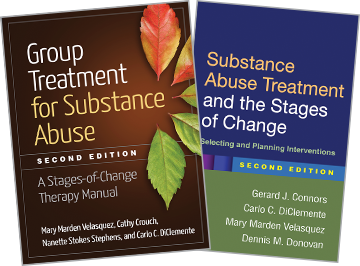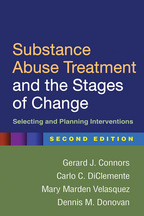Substance Abuse Treatment and the Stages of Change
Second Edition
Selecting and Planning Interventions
Gerard J. Connors, Carlo C. DiClemente, Mary Marden Velasquez, and Dennis M. Donovan
HardcoverPaperbacke-bookprint + e-book
Hardcover
orderJanuary 3, 2013
ISBN 9781462508044
Price: $89.00 356 Pages
Size: 6" x 9"
Paperback
orderSeptember 28, 2015
ISBN 9781462524983
Price: $39.00356 Pages
Size: 6" x 9"
Check out a special package offer including this title!

See related items for this product
Sign up for emails on upcoming titles on Addictions (with special discounts)!
“A rock solid book. It deserves to be utilized in the best and most up-to-date addiction education programs.”

—Journal of Teaching in the Addictions
“A superb text that provides an excellent foundation for evidence-based practices for those clinicians who work in both administrative and clinical capacities with this challenging population.”

—Clinical Social Work Journal
“The transtheoretical model is enormously popular with practitioners and researchers in the addictions field....Readers now have an authoritative source on the clinical application of the transtheoretical model.”

—Journal of Studies on Alcohol
“More than just a 'how-to-do' manual—readers will find it to be more of a 'how to think' book....A useful, practical, and well-written guide for both students and professionals involved in the treatment of alcohol and other drug problems. Therapists will appreciate the many clinical case studies presented throughout the text.”

—Addiction
“This book is unique in the field of chemical dependency assessment and treatment since it is the first comprehensive application of Prochaska and DiClemente's therapeutic stages-of-change model to problems of substance abuse and treatment....Recommended for any library collecting literature on substance abuse treatment for the use of upper-division undergraduates through faculty and professionals.”

—Choice
“For over a decade, the stages-of-change model has created a paradigm shift in the conceptualization, design, and delivery of treatment services for substance use disorders. This updated volume reflects the ongoing evolution of the theoretical model and its ever-expanding clinical application. Particularly noteworthy is a completely revised chapter on group treatment and an intriguing new chapter on applications in health care and other settings. This book is both a valuable treatment guide for clinicians and an excellent classroom text for students.”

—Arnold M. Washton, PhD, Executive Director, Recovery Options, New York City and Princeton, New Jersey
“This is a unique volume produced by leading experts in the addiction field. It presents key concepts related to the process of change and shows how they can inform treatment. The book is straightforward and highly readable, with engaging clinical examples.”

—Marc Galanter, MD, Director, Division of Alcoholism and Drug Abuse, New York University School of Medicine
“The path toward successful resolution of substance use problems is not an easy one. This book offers up-to-date research and clinical information focusing on processes of change when working with individuals with problematic substance use. The roadmap to change offered in this book can be used by a wide range of clinicians. Updates in the second edition address the current needs of the field and add to the utility of the book for clinicians, students, and instructors.”

—Shulamith Lala Ashenberg Straussner, PhD, LCSW, Silver School of Social Work, New York University
“I have been using this text for four years in my Treatment Delivery course. The text describes in detail the stages encountered in making any significant lifestyle change, and helps students conceptualize and understand the process of recovery. Students get valuable insights into how to plan interventions that assist clients to move from each stage of change to the next.”

—E. Michael Bartlinski, LCSW-C, Adjunct Professor of Human Services, Anne Arundel Community College, Arnold, Maryland (on the first edition)
—Journal of Teaching in the Addictions
“A superb text that provides an excellent foundation for evidence-based practices for those clinicians who work in both administrative and clinical capacities with this challenging population.”
—Clinical Social Work Journal
“The transtheoretical model is enormously popular with practitioners and researchers in the addictions field....Readers now have an authoritative source on the clinical application of the transtheoretical model.”
—Journal of Studies on Alcohol
“More than just a 'how-to-do' manual—readers will find it to be more of a 'how to think' book....A useful, practical, and well-written guide for both students and professionals involved in the treatment of alcohol and other drug problems. Therapists will appreciate the many clinical case studies presented throughout the text.”
—Addiction
“This book is unique in the field of chemical dependency assessment and treatment since it is the first comprehensive application of Prochaska and DiClemente's therapeutic stages-of-change model to problems of substance abuse and treatment....Recommended for any library collecting literature on substance abuse treatment for the use of upper-division undergraduates through faculty and professionals.”
—Choice
“For over a decade, the stages-of-change model has created a paradigm shift in the conceptualization, design, and delivery of treatment services for substance use disorders. This updated volume reflects the ongoing evolution of the theoretical model and its ever-expanding clinical application. Particularly noteworthy is a completely revised chapter on group treatment and an intriguing new chapter on applications in health care and other settings. This book is both a valuable treatment guide for clinicians and an excellent classroom text for students.”
—Arnold M. Washton, PhD, Executive Director, Recovery Options, New York City and Princeton, New Jersey
“This is a unique volume produced by leading experts in the addiction field. It presents key concepts related to the process of change and shows how they can inform treatment. The book is straightforward and highly readable, with engaging clinical examples.”
—Marc Galanter, MD, Director, Division of Alcoholism and Drug Abuse, New York University School of Medicine
“The path toward successful resolution of substance use problems is not an easy one. This book offers up-to-date research and clinical information focusing on processes of change when working with individuals with problematic substance use. The roadmap to change offered in this book can be used by a wide range of clinicians. Updates in the second edition address the current needs of the field and add to the utility of the book for clinicians, students, and instructors.”
—Shulamith Lala Ashenberg Straussner, PhD, LCSW, Silver School of Social Work, New York University
“I have been using this text for four years in my Treatment Delivery course. The text describes in detail the stages encountered in making any significant lifestyle change, and helps students conceptualize and understand the process of recovery. Students get valuable insights into how to plan interventions that assist clients to move from each stage of change to the next.”
—E. Michael Bartlinski, LCSW-C, Adjunct Professor of Human Services, Anne Arundel Community College, Arnold, Maryland (on the first edition)



